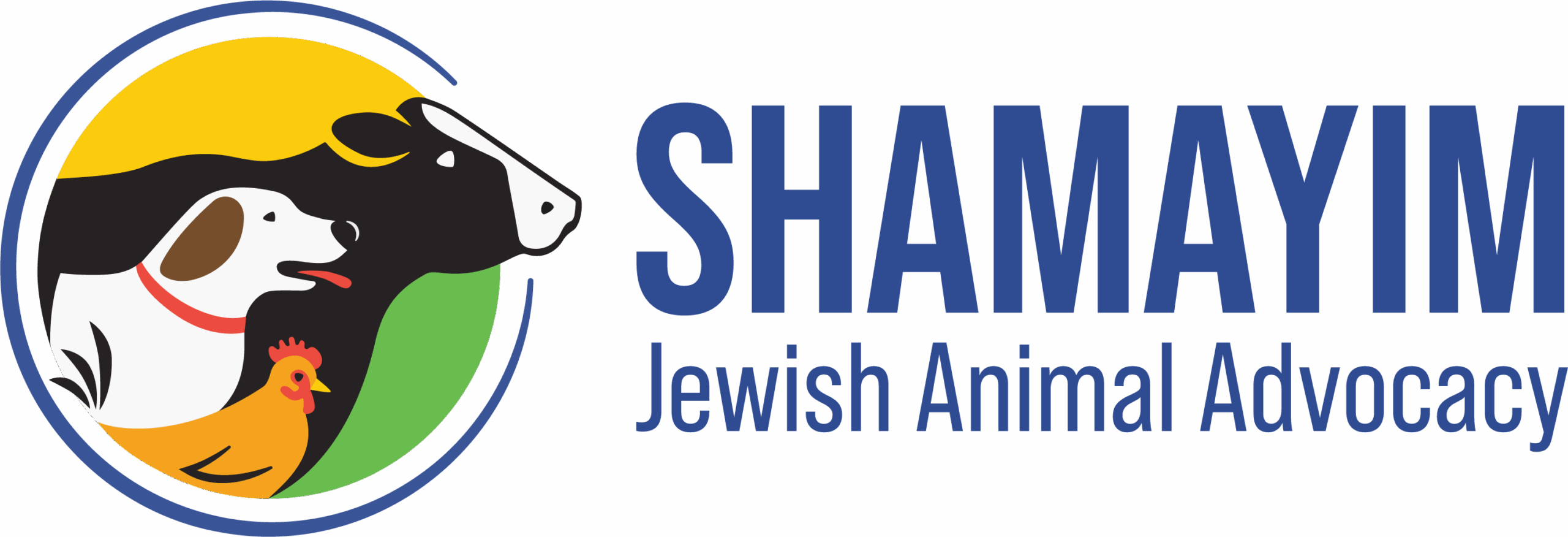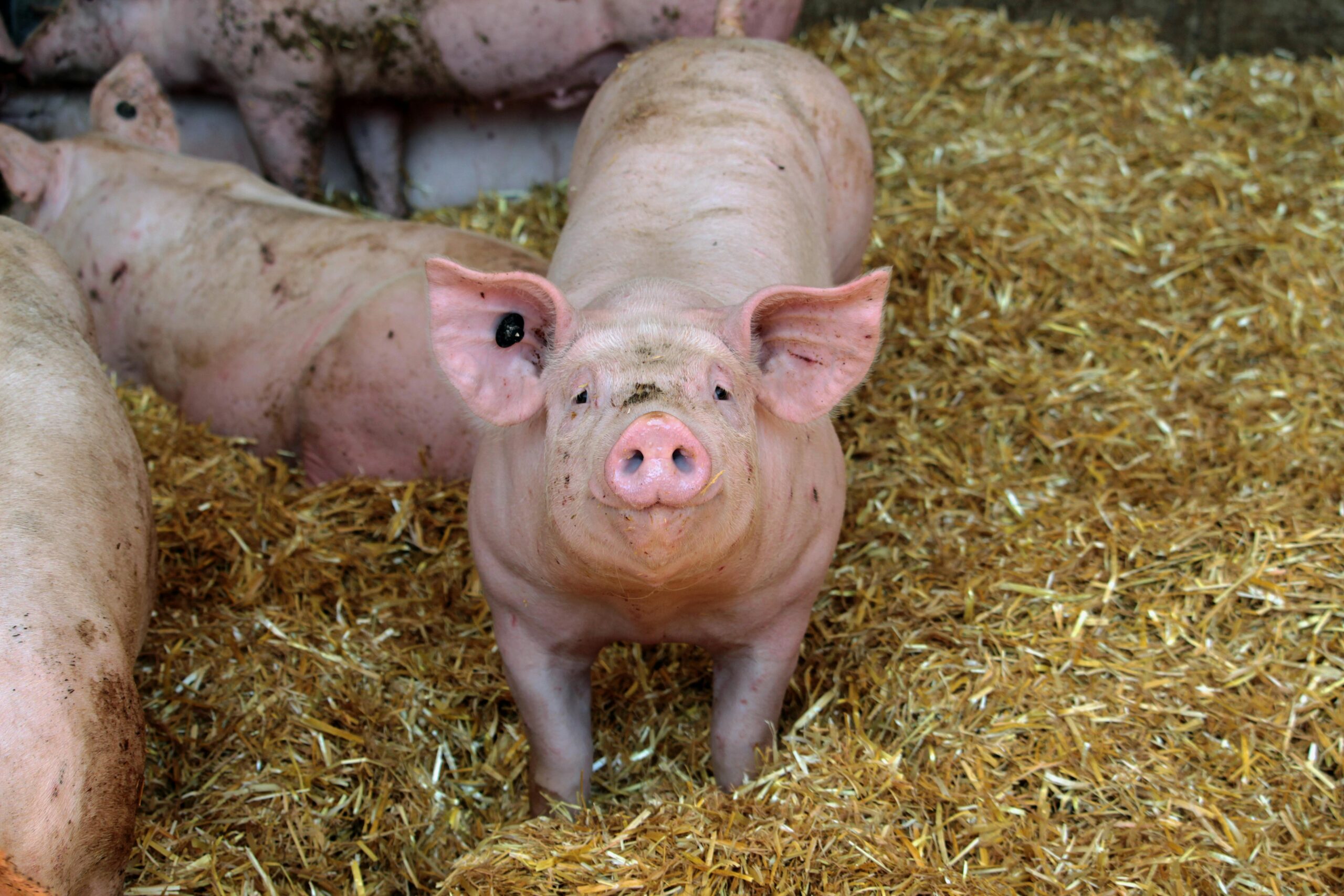By Rabbi Shmuly Yanklowitz
You might be wondering why a Rabbi is writing about pigs. After all, Jews don’t eat pork- pigs are not kosher. But does that mean we should ignore them? Are pigs not deserving of our compassion, respect, and, at the very least, acknowledgment?
Each year, around 1.4 billion pigs are slaughtered globally, with more than half enduring extreme suffering in factory farms. Despite their unkosher status in Jewish dietary law, pigs are intelligent and social beings, scientists have found they outperform dogs and even three-year-old children in cognitive tests. Yet, they are treated as mere commodities, confined in cages, and subjected to unimaginable cruelty.
There are two main forms of pig farming: one for breeding pigs (female pigs used to produce piglets) and another for meat production (pigs raised and killed for pork). Both are horrifying and demand our attention.
The Life of a Mother Pig: A Cycle of Misery
A mother pig, known as a sow, is repeatedly forcibly impregnated to produce piglets for meat. She spends her entire 16-week pregnancy trapped in a gestation crate, a metal cage so small she cannot even turn around. In the wild, pigs instinctively build nests before giving birth, but this natural behavior is completely denied in factory farms. The frustration of confinement drives these intelligent animals to exhibit signs of clinical depression, such as biting the metal bars that imprison them.
Just before giving birth, farmers move the sow to a farrowing crate, another restrictive cage that prevents her from moving freely. These crates are designed to stop her from accidentally crushing her piglets, but they come at a cruel cost. The extreme confinement leads to higher rates of stillbirth, deprives the sow of any physical or mental stimulation, and severs the natural mother-child bond.
A sow’s maternal instinct is powerful, pigs in the wild nurture their piglets for up to four months. On factory farms, piglets are taken from their mothers after just 3–4 weeks, a deeply distressing experience for both mother and offspring.
Mothers do not just love their babies out of instinct, they feel it deep within them. When a human mother holds her newborn, something incredible happens inside her body: the release of oxytocin, the “love hormone,” floods her system, cementing her bond with her child. It’s what makes a mother feel overwhelming love, a need to protect, a sense that this tiny being in her arms is a part of her soul.
Pigs feel the same thing. The same hormone that surges through a mother when she cradles her baby is released when a mother pig feeds her piglets. When her babies are ripped away from her after only a few weeks, that connection is violently severed. She screams for them. She grieves. She is impregnated again and forced into this unrelenting cycle of loss over and over until her body gives out.
Pigs can live up to 20 years, yet factory-farmed sows are killed after just 2–3 years once their bodies can no longer endure the relentless cycle of forced pregnancies. They are used as baby-making machines, reduced to mere production units rather than the intelligent, sentient, and loving beings that they are.
Piglets: A Short Life of Suffering
The piglets born into this system face a fate just as bleak. Those raised for pork are killed after only 6–7 months and spend their entire lives in overcrowded concrete pens with hard, slatted floors, deprived of fresh air and natural behaviors. Packed together in darkness, they experience boredom, frustration, and aggression, often resorting to tail biting, a destructive behavior caused by stress and lack of stimulation.
Rather than addressing the root cause of these behaviors, the unnatural and inhumane conditions, farmers resort to mutilation. Piglets have their tails cut off, and their teeth clipped, often without anesthetic, to prevent injuries from aggressive pen mates. Instead of improving their conditions, the industry chooses painful bodily mutilations to accommodate an inherently cruel system.
Some factory farms have become industrial horror stories, such as China’s “pig hotels” – 26-floor factory farms housing 1.2 million pigs in stacked cages. This is mass-scale cruelty, built for profit at the expense of the animals’ most basic needs.
Abuse Beyond Confinement
The cruelty inflicted on pigs extends beyond confinement. Undercover investigations have exposed rampant abuse on pig farms:
- Workers punching, kicking, and beating pigs with metal rods.
- Piglets castrated by hand, tails sliced off without pain relief.
- Injured pigs are left to suffer without veterinary care.
- Perhaps most disturbing, some farms practice “feedback” – forcing sows to eat a blend of piglet intestines and feces, a practice meant to boost immunity but grotesquely forces them into cannibalism.
Judaism Commands Us to Care – Even for Pigs
At this point, you might be thinking, “I don’t eat pork, so this doesn’t concern me.” But Judaism teaches us that we must not remain silent in the face of suffering, even if we are not directly involved.
The principle of Tzaar Baalei Chayim (preventing animal suffering) comes directly from the Torah:
“When you see the donkey of your enemy lying under its burden and would refrain from raising it, you must nevertheless raise it with him.” – Exodus 23:5
Hashem commands us to help even the suffering animal of an enemy. If this is true for an enemy’s donkey, how much more so for a fellow sentient creature- one unjustly imprisoned and slaughtered in the billions?
Yes, pigs are not kosher. But they are not our enemy; even if they were, we would still be obligated to care for them.
The Bigger Picture: Ending All Animal Exploitation
Even if you don’t eat pork, participating in the broader system of animal agriculture – including kosher meat and dairy – supports the very industries responsible for factory farming. The normalization of consuming animal products perpetuates a system of suffering, mass confinement, and the commodification of sentient beings.
Thankfully, stepping out of this cycle of harm is easier than ever. Choosing hummus over cream cheese, lentil soup over chicken soup, or almond milk over cow’s milk is only a small change for us, but for the billions of animals suffering each year, these changes are a matter of life and death.
Judaism is a religion of compassion, justice, and ethical responsibility. The Torah calls on us to protect the vulnerable, to act with kindness, and to challenge systems of oppression. The mass suffering of pigs – and all factory-farmed animals – is a moral crisis, one that we have the power to address.
If we are genuinely committed to living by Jewish values, we must take a stand against this system of cruelty, not just for pigs, but for all of G-d’s creatures.





Leave a Reply